Missing even a single tooth can have a significant impact on your smile, health, and quality of life. Even if that space is located in the back of your mouth where no one can see it, it can still have a dramatic effect. Remaining teeth may shift to try and fill in the gap, and you might have a hard time chewing some of your favorite foods. Naturally, these issues and more become exponentially worse if you are missing a few, several, or all your teeth! Fortunately, there is a simple solution to replace not just the crown, but your entire missing tooth – getting dental implants in Lexington. This state-of-the-art tooth loss solution is the next best thing to natural teeth and has the potential to change your life. Read on to learn more and give us a call today to schedule your dental implant consultation!
Dental Implants — Lexington, KY
The Next Best Thing to Natural Teeth

Why Choose Dental Wellness of Lexington For Dental Implants?
- Dr. Feck Is a Nationally Recognized Dental Implant Specialist
- Entire Dental Implant Procedure Performed Under One Roof
- Sedation Dentistry Available for Optimal Comfort
What Are Dental Implants?

Dental implants are small, screw-shaped posts that are designed to replace the roots of a missing tooth. They’re inserted through the gums directly into the jawbone, and since they’re made of biocompatible titanium, they literally fuse with the tissue to become a part of your jaw. This create a strong, reliable, and completely natural foundation for your replacement tooth or teeth. One or several dental implants can be used to support a crown, bridge, partial, or full denture to replace any number of teeth! Rebuilding missing teeth from the roots up gives you a smile that looks, feels, and functions just like natural!
Dr. Anthony Feck Is Your Lexington Dental Implant Specialist

For the last 20 years, our own Dr. Feck has taught dental implant Clinics both in Lexington and around the country in order to help dentists learn more about utilizing this fantastic treatment. He has received universal praise and multiple awards for his Clinics, and he's undoubtedly helped countless patients through his students. This dedication to expertise and education is a big part of his approach when treating his own patients as well, so when you come to get dental implants at Dental Wellness of Lexington, you can trust that you’re only experiencing the best.
The 4-Step Dental Implant Process

Most other dental offices have to refer their implant patients to an outside specialist to have their new roots surgically placed into their jaw. This bouncing between different offices adds expense and stress to the implant process, which is why Dental Wellness of Lexington is happy to provide the entire procedure ourselves from beginning to end. From your first consultation, until you walk out of our office with a renewed smile, you’ll be able to work with the same dentists and team that you trust. Keep reading to learn more about how dental implants work and what you can expect from the treatment process in Lexington!
Initial Dental Implant Consultation

The first step of the dental implant treatment process is to determine if this option is an ideal solution for you. That said, nearly every adult who’s missing one or more teeth can be eligible for the procedure. The only thing you’ll have to consider are conditions that can threaten the success of your implants, such as tooth decay, gum disease, and insufficient jawbone density. If our team detects any of these complications, we’ll have to provide you with preliminary treatments to ensure a sturdy, healthy foundation for your new smile. Once you’re ready, we can walk you through your plan so you know what to expect, including the cost and timeframe of your procedure.
Dental Implant Surgery

After your consultation, we’ll schedule you for minor oral surgery at a later time. Since we perform the placement procedure in-office, you won’t have to worry about driving around town to undergo your treatment. This way you can receive care from a dentist and dental team that you already know and trust!
Your dentist will begin by making a small incision in the gum line for each implant to be placed. This will allow them to reach your jawbone and carefully embed the metal post in the exact location and position that was planned. Once your implants have been placed, they’ll suture your gums around them and cover them with protective caps so you can recover safely.
Dental Implant Osseointegration & Abutment
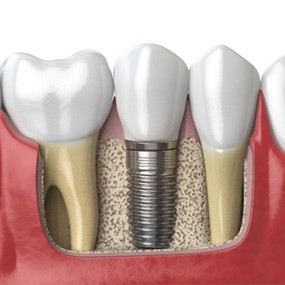
During your healing process, your jawbone will need to undergo osseointegration, which is when the jawbone fuses with the dental implants. If successful, this will allow the metal posts to become with your bone tissue and offer an incredibly stable and lifelike foundation for your restorations. This process can typically take around 4 to 6 months to complete.
After you’ve healed sufficiently, you’ll come back into our office to receive your abutments. These small connector pieces will be the components that secure your new set of pearly whites. We’ll take impressions of the area and start fabricating your restorations while you allow your gums to heal for several weeks.
Delivery of Dental Implant Restoration(s)

Once you’ve recovered from getting your abutments, you’ll return to our office to receive your brand-new crown, bridge, partial, or full dentures. After our team has properly fitted your restorations to your dental implants, we’ll confirm that your bite feels natural and functions correctly. You can also ask any questions you might have, as we’ll want to make sure you’re completely satisfied with your results before sending you on your way to enjoy your full smile!
Benefits of Dental Implants

As the only option to replace a missing tooth from root to crown, dental implants have a lot more to offer than traditional tooth replacement options like dentures and dental bridges. Dental implants are truly the next best thing to natural teeth, which affords them a wide array of benefits that you simply can’t get from other restorations. From your everyday life to your long-term health and wellbeing, there are numerous benefits to dental implants. Read on to learn more about some of the most important ways dental implants can improve your quality of life.
Day-to-Day Benefits

- Reliable security: Unlike other replacements that rely on the remaining teeth or gums for support, implants are anchored within thick jawbone material, meaning patients never have to worry about their new teeth slipping or moving unexpectedly.
- Beautifully lifelike: Dental implants sit within the gumline just like natural teeth and are topped with 100% custom-made restorations that are carefully crafted from dental porcelain. This durable material is well-known for how much it looks like natural tooth enamel, so your new teeth will be virtually indistinguishable from your natural ones.
- Restored chewing power: Thanks to their firm foundation in your jaw, dental implants can bring back 80% or more of your natural biting force. This means you can easily and comfortably eat all your favorite foods, including apples, corn on the cob, steak, nuts, and anything else on your plate.
Health Benefits

- Jawbone preservation: It’s natural for the jawbone to slowly begin to deteriorate after a tooth goes missing. Since dental implants stimulate circulation in the bone tissue where the missing tooth’s roots once were, they can stop and even reverse this process. They are the only tooth replacement option that can do this.
- Better oral health: Dental implants don’t have the small, bacteria-collecting nooks and crannies that dental bridges and dentures have. Plus, they’re much easier to keep clean since they only require regular brushing, flossing and rinsing with mouthwash. In the end, this dramatically lowers your risk of oral health issues like gum disease, dental infections, and tooth decay.
- Keep your remaining teeth: When missing teeth aren’t replaced and the jawbone begins to shrink away, the surrounding healthy teeth will begin to lose their firm foundation and may eventually fall out. When you replace one or several missing teeth with dental implants, you help keep your remaining teeth firmly in place.
Long-Term Benefits

- Look younger for longer: After tooth loss, jawbone deterioration typically causes a sunken, aged appearance in the facial features. Dental implants prevent this process and support the facial muscles, giving you a healthy, youthful appearance to keep you looking your best.
- A lifelong solution: With minimal maintenance, a patient can rely on their dental implants for 30 years or more. In fact, with good oral hygiene, most patients can easily expect their dental implants to last a lifetime!
Who Dental Implants Can Help

No matter how many teeth you might be missing, dental implants can be used to help rebuild your smile! On top of that, you can expect them to stand the test of time, no matter what foods you enjoy. To get started, all you need to do is give Dental Wellness of Lexington a call to set up a consultation. During your visit, we’ll discuss your goals for your smile and what it will take to achieve them. Naturally, we’ll first check to see if you’re a good candidate for dental implants, and from there, we can move on to designing your custom dental implant treatment plan.
Who Is a Good Candidate for Dental Implants?

While just about anyone healthy adult can be eligible for dental implant treatment, sometimes certain issues can make treatment riskier without professional intervention. To be the absolute best candidate for dental implants you should have the following:
- Substantial Jawbone Density – the jawbone needs to be thick and strong enough for a dental implant. If there is not enough jawbone available, it’s possible that you will need a bone graft prior to beginning dental implant surgery.
- Great Oral Health – If you have gum disease, tooth decay, or another preexisting dental problem, it could compromise your dental implant treatment. For this reason, we’ll need to treat these concerns first.
- Decent overall health – Since dental implants are considered a surgical procedure (albeit a minor one), you should be healthy enough to receive one. Be sure to ask your doctor first if dental implant treatment can be safely completed without any major risks attached.
Once we’ve determined that you’re a good candidate for dental implants, or have helped you become one with a preliminary treatment, we can design your treatment plan based around your preferences and how many teeth you’re missing.
Missing 1 Tooth

For a lone gap in the smile, a single dental implant root and crown can be placed between two healthy teeth without affecting them at all. This is a much less invasive approach compared to a traditional bridge in which the neighboring teeth have to be filed down to support the prosthetic. The restoration is made from high-quality dental ceramic, ensuring it looks natural for decades to come.
Missing Multiple Teeth

A small number of implant roots can be used to support a dental bridge. These can replace numerous teeth throughout the mouth, and thanks to the implants, patients will enjoy a hold and stability a traditional dental prosthetic simply can’t offer. In fact, a pair of dental implants can hold as many as three or four crowns, making it more cost-efficient than you may have previously thought.
Missing All Teeth
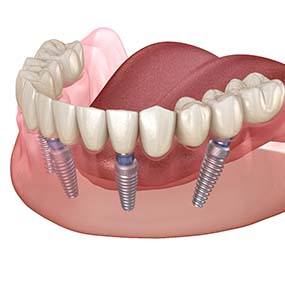
Instead of having to replace each tooth with an individual implant, a full or partial denture can be secured to the jawbone using just four to six well-placed roots. Implant dentures not only look more natural than traditional ones, but they also restore more of a patient’s bite strength as well, enabling them to eat a wider variety of foods with ease. Additionally, you can opt to have your denture be either fixed or removable, it truly depends on your preference!
Understanding the Cost of Dental Implants
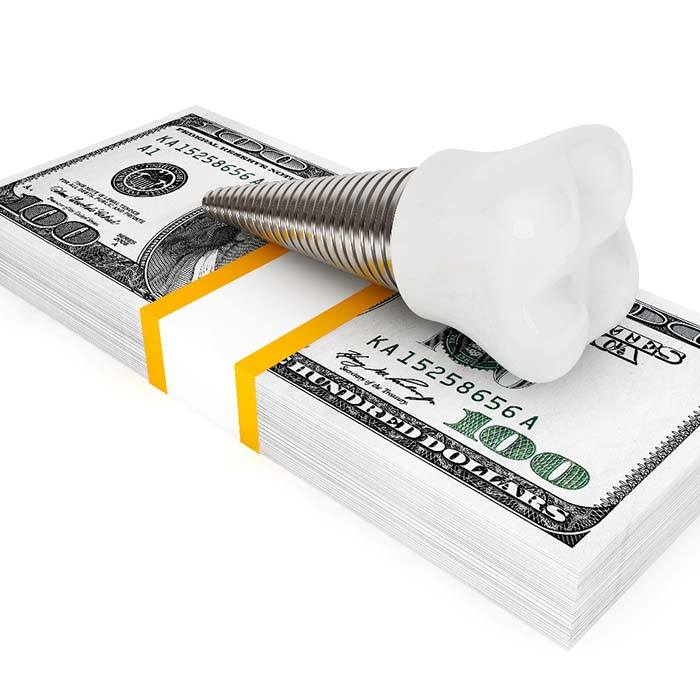
Every dental implant treatment we provide is completely tailored to each unique individual, and because of this, the cost of the procedure can vary quite a bit from patient to patient. Factors such as the number of implants, the location of the missing teeth, and the type of restoration used can all influence the final price. Before beginning your treatment, our team will go over all pricing information with you so there are never any surprises throughout the process.
While it’s true that dental implants tend to cost more upfront than other traditional options, they also last dramatically longer as well, which usually helps patients save money overall. Unlike with a regular bridge or denture that needs to be replaced every five to seven years on average, dental implants can be trusted to look great and function normally for decades on end, meaning a patient will spend thousands less on periodic maintenance.
Preliminary Treatments & Dental Implant Surgery
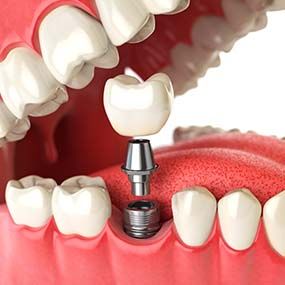
Getting dental implants is a process, and each stage comes with its own price tag. First, some patients might need to undergo additional procedures beforehand. For instance, bone grafts might be required if the jawbone isn’t currently dense enough to support implants. Preexisting oral health problems, such as gum disease and tooth decay, will also need to be treated before the process can move forward. The cost of these treatments will naturally add to the final price.
The dental implant surgery itself will incur its own cost. We’re pleased to offer start-to-finish dental implant treatment, so you won’t need to spend extra time and money seeing an unfamiliar specialist.
The Parts of Your Dental Implant
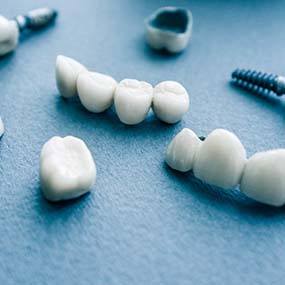
Part of the reason coming up with a general price is so difficult is because there are many different forms an implant treatment can take. Some patients will only need one implant while others might need as many as eight. Then there’s the type of prosthetic tooth to consider; will you need a single crown, a dental bridge, or a full set of dentures? The answer can greatly influence the final cost.
Another variable is the material used to create the implant. While they’ll be made of titanium most of the time, for patients with metal allergies, zirconia can be employed as a substitute.
How Dental Implants Can Save You Money

Even though dental implants will likely cost more than traditional dentures and other forms of tooth replacement, over the long term you’ll find they’re well worth the price. They help keep the jawbone strong and can help prevent the long-term complications often caused by tooth loss (such as an increased risk of cavities and gum infection), reducing the need for additional treatments later. Plus, since implants typically last for decades, many patients are finding that they can actually cost less money than dentures or bridges that will need to be replaced more often.
Does My Dental Insurance Cover Dental Implants?

You’ll need to review your personal plan to figure out your benefits. Generally speaking, your insurance usually won’t cover dental implants. They may partially cover certain steps in the process, however. For example, if you need treatment for gum disease, many plans will help pay for periodontal therapy.
Making Dental Implants Affordable

For treatment that isn’t covered by your insurance, we offer dental financing in the form of CareCredit and Lending Club; we also have an in-house membership plan that can provide many of the same benefits as regular dental insurance. Feel free to speak with your trusted dentist in Lexington about your financial situation so that we can help you develop a strategy that’s right for you!
Dental Implant Technology

As one of dentistry’s most complex treatments, dental implant placement requires a lot of expertise to do correctly. Fortunately, Dr. Feck has not only the clinical experience and training necessary but also the technology to make sure every case is executed successfully. We are proud to use the industry’s most cutting-edge technology to give our patients the best possible care with fewer complications and a smoother experience from start to finish.
3D Cone-Beam Imaging/ 3D CT Scanning
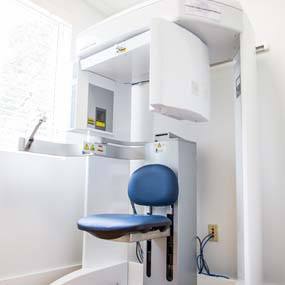
Believe it or not, the most important part of the implant placement process occurs before the surgery itself. In order to plan effectively for the procedure, we need a highly precise model. Although digital technology has improved the quality of X-rays, these images only show a part of the picture underneath the gums. To get a more detailed view of your oral cavity, we utilize a 3D cone beam scanner, which also reveals the location of blood vessels, tooth roots, nerves, and other structures that can impact the placement procedure. With this information, we can avoid possible complications, accelerate healing, and ensure success.
Guided Dental Implant Surgery
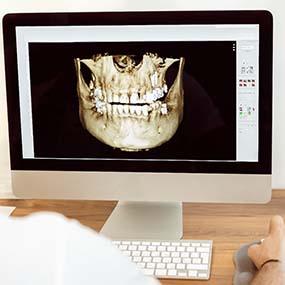
When it comes to planning for dental implant surgery, you can never be too prepared or too precise. Instead of relying solely on the dentist, we bring in technology to guide the surgery. This guidance from helps us pinpoint the exact spots to position the implant posts. It also reduces the element of human error, leading to a higher success rate overall. As a result, our patients can heal more quickly, experience less discomfort, and enjoy their restored smiles to the fullest.
3Shape Trios
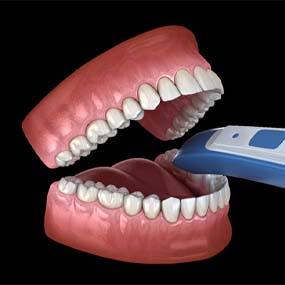
Once the implant post has been integrated with the jawbone, it’s time to work on getting your restoration made, which means we need to take impressions of your mouth. That’s where our 3Shape TRIOS intraoral scanner comes in. Instead of collecting old-fashioned “putty” impressions, we use this technology that takes scans of your oral cavity in just a matter of minutes with any of discomfort. In addition to being more pleasant, this technology also tends to be more accurate, which means that your restoration is more likely to fit your mouth with relatively fewer adjustments needed.
Advanced Dental Implant Procedures
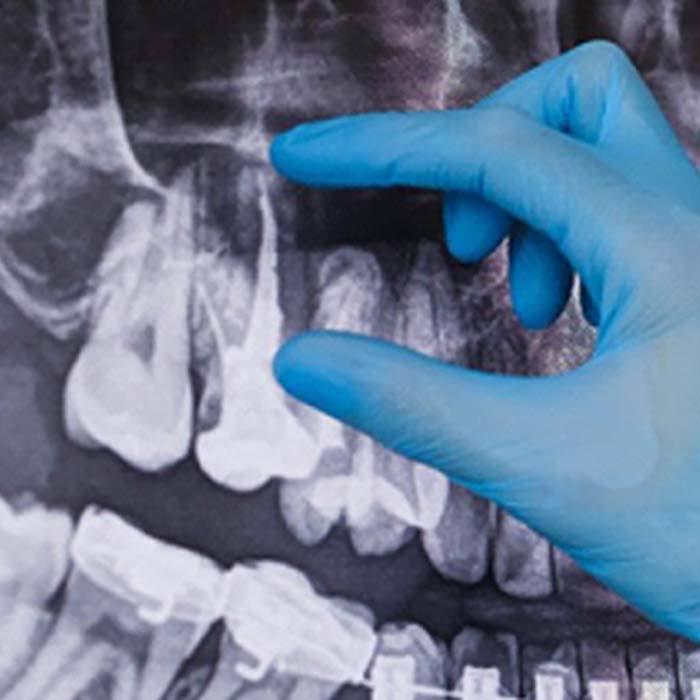
Dental implants can last for several decades with an accurate, precisely planned treatment by a professional. At Dental Wellness of Lexington, our implant dentists want to make sure that your investment in a newly restored smile is well worth it, which is why they may suggest a supplementary treatment to make your oral structure more compatible with the procedure. If your jawbone isn’t quite dense enough or your sinuses are located in a non-ideal position, Drs. Feck, Combs, and Wilson may suggest getting a bone graft or sinus lift before your implants can be placed. That way, you won’t have to worry about complications occurring down the road. To learn whether you need preparatory procedures, schedule a consultation for dental implants today by contacting our office.
Bone Grafting
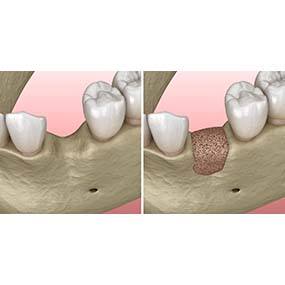
Your nationally-recognized implant dentist Dr. Feck will examine your oral structure and facial feature during your initial consultation. At Dental Wellness of Lexington, our office is equipped with a CT/cone beam scanner and digital X-ray imaging so we can acquire a detailed image of your jawbone and mouth.
With the information that we gather, we’ll be able to determine whether your jawbone is dense enough to fully bond with the titanium implants. This part of the procedure is absolutely vital and gives your replacement teeth a strong and stable foundation to be secured to. Unfortunately, when people have been suffering from tooth loss for a while, their jawbone may begin to deteriorate because it isn’t being stimulated. In these cases, it’s common for patients to receive bone grafts.
Bone grafts in Lexington allow us to increase the volume of a thinned-out area of your jawbone to provide your dental implants with better support. This can happen by either removing a small amount of bone from another area of your body and using it to rebuild your jaw or by using bone from an entirely different source, such as a donor.
Sinus Lifts
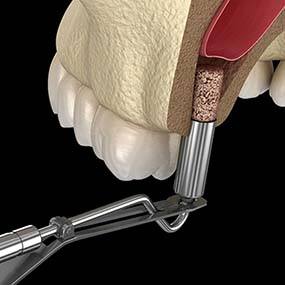
Another common supplementary procedure that patients need are sinus lifts in Lexington. After we collect images of your facial structure during your initial consultation, we’ll be able to see where your sinus cavities are located in relation to your upper jaw. If they’re too close, you will need to have them surgically lifted in order for your dental implants to be successfully placed.
The treatment will begin by making sure that you’re completely numb and can’t feel a thing. In order to gently push your sinuses upward to make room for the dental implants, your jawbone will need to be exposed using a small incision in your gums. After accessing the jawbone area and lifting the sinus cavities, bone graft material will replenish the density of your jaw. Finally, your gums will be stitched shut to heal, which typically takes place over the next two to three days.
After you’ve received any necessary preparatory procedures, you’ll be ready to schedule your dental implant surgery with confidence that your oral structure can support your new smile.
Dental Implant Failure & Salvage

Dental implants boast an impressive success rate of more than 95%. You can rightly expect your new teeth to stand the test of time! Of course, it must also be acknowledged that in rare cases, dental implant failure can occur due to an infection or other unfortunate circumstances. If you ever suspect that something is not right with your implants, call our team right away. We will examine your mouth and recommend your next steps. Our goal is to get your oral health and function back on track ASAP!
Learn More About Dental Implant Failure & Salvage
Dental Implant Post-Op Instructions

After our team surgically places your dental implants into your jawbone, you will go through a recovery process. Do not let that prospect intimidate you. As long as you follow some simple post-op instructions, you are likely to have a smooth and complication-free healing period. Below, you will find some specific steps you should take after your procedure.
What to Do Directly After Dental Implant Surgery

After your surgery, blood clots should start to form at your implant sites. Those clots are a key part of your body’s healing process, so you must protect them. Here is how you can do that:
- Do not spit. Instead, swallow extra saliva or use tissues to absorb it.
- Do not smoke or use drinking straws. The suction action could disturb your blood clots.
- Do not touch your surgical sites. Resist the temptation to touch your surgical sites with your tongue or fingers.
Common Side Effects When Recovering from Dental Implant Placement

In the days after your surgery, you might experience:
- Intermittent bleeding. This may go on for a few days. It can be controlled with gauze and light pressure.
- This may last for a week or longer. Cold compresses can keep it to a minimum.
- General discomfort. You should get plenty of rest and take pain relievers as necessary.
If you experience any severe or unusual side effects during your recovery, call our team right away.
Your Diet After Dental Implant Surgery

At first, you should adhere to a no-chew diet that will not cause pain or irritation at your surgical sites. Things like mashed potatoes, brothy soups, pudding, yogurt, and even ice cream are all acceptable choices. When you feel up to it, you can move on to fork-tender foods, such as scrambled eggs, pasta, and meatloaf. Eventually, you can resume fairly normal eating habits. You should just continue to be careful until your new teeth get attached to your implants.
Post-Op Health & Oral Hygiene
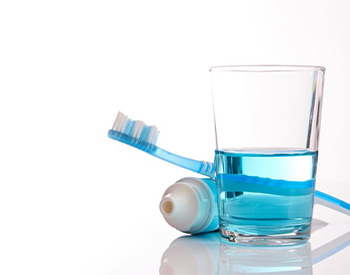
To keep your mouth clean after your surgery, you should:
- Start brushing the day after your procedure. Just exercise great caution around your surgical sites.
- Rinse with warm salt water. This can reduce swelling and fight bacterial buildup.
- Use mouthwash appropriately. Mouthwashes with a high alcohol content should be avoided, but if you have a prescription mouthwash, be sure to use it as directed.
What to Do After Your New Teeth Are Attached

When we attach your permanent restoration to your implants, your gums might be tender for a few days, and the new teeth may feel strange in your mouth. However, no downtime is required, there should be no bleeding, and you will be able to start using your restoration right away.
Maintaining & Caring for Your Dental Implants

As someone interested in the idea of dental implants replacing your missing teeth, you’ll be pleased to know that once they are firmly in place, you can treat your newly designed smile the same way as you do your regular teeth. With no additional money spent on cleaning solutions or denture adhesives, this can be a welcomed reality, but you must understand that dental implant care in Lexington is necessary if you want to make sure your prosthetics remain firmly in place for a lifetime. After all, this timely and costly investment is one you want to make last, so here are some helpful tips to remember when taking care of your dental implants:
Make Oral Hygiene a Priority

While it is true that your dental implants in Lexington cannot decay, your regular, natural teeth can, which is why you’ll need to keep up with your oral hygiene routine. Brushing twice a day for two minutes, using fluoride toothpaste, flossing at least once a day, and rinsing with an antimicrobial mouthwash is imperative. Not only will it remove harmful bacteria that can lead to tooth decay, but it can also improve gum health, which is invaluable when it comes to safeguarding your implants. If you want to keep gum disease away and avoid the potential for bone and tooth loss, stay on top of your dental health regime.
Eat a Healthy Diet

Who doesn’t love a cookie or slice of pie now and then? Eating sugar and starch in moderation isn’t necessarily bad as long as you remember to brush your teeth afterward. However, making these an integral part of your daily diet will only wreak havoc on your waistline and dental implants. By swapping out foods that can lead to gum disease and tooth decay with those that are beneficial to your health, you’ll be taking the appropriate steps to maintain your implants. Leafy greens, fruits, vegetables, dairy, and even lean proteins can help keep your natural teeth in tip-top shape and your implants on a firm foundation.
Break Bad Habits

Smoking, eating ice, chewing on pens and pencils, using your teeth as tools, and biting your fingernails are all bad habits that will eventually damage your natural teeth and harm your dental implants. Oftentimes, these are done without even realizing it, but if you don’t start paying attention to even the tiniest habits, it could cost you your smile. Minor cracks, fractures, and breaks can compile over time, causing your implants to eventually fail. This is why you’ll want to be mindful and work hard to break these bad habits even before you receive your dental implants.
Protect Your Dental Implants

No one is saying you can’t enjoy the outdoors or play sports once you have dental implants, but you will want to take precautions when it comes to engaging in contact sports that could damage your implants. Fortunately, you can talk to your implant dentist in Lexington about a customized mouthguard that will safeguard your teeth should you take a tumble, face a hard hit, or find yourself reaching for the ball only to be elbowed in the face. But even if sports aren’t your thing, you may still need a customized mouthguard if you tend to grind your teeth at night. Stress from work or normal daily pressures can lead to bruxism, which can wear down tooth enamel and damage restorations. With a mouthguard, you can keep your teeth from grinding or clenching, allowing your implants to remain free of damage.
Schedule Regular Dental Checkups

Even if you have an entire smile made up of dental implants, you will still need to schedule and keep your six-month dental checkups and cleanings. These visits not only allow us to check for signs of decay and gum disease, but we’ll also review your dental implants to make sure no issues are developing that could put them at risk for failure in the future.
Dental Implant FAQs
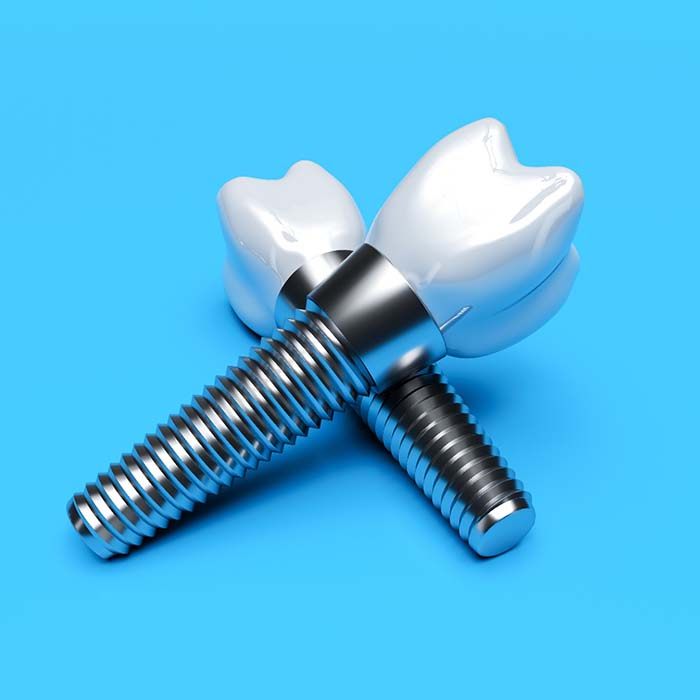
Drs. Feck, Combs, and Wilson are here to answer any and all questions you might have about dental implants in Lexington. It’s important that you thoroughly understand the entire process before actually undergoing the surgery. Below are the answers to just a few of the questions that patients will commonly ask about dental implants. Since your situation is unique, you’ll probably have plenty of concerns of your own that you can voice during your implant consultation.
How Long Does It Take To Get Dental Implants?
Receiving dental implants is a process that can last several months. After your consultation and any necessary preliminary treatments, the first phase is the placement of the actual implant post in the jaw. It’ll take about three to six months for the gums around the surgical site to heal and for the bone to integrate with the post. Once that’s done, the next step is to attach an abutment, and a little more time is allowed for the gums to grow around it as well. (In some cases, the abutment and the implant post are attached at the same time.) The final step is to receive your prosthetic tooth or teeth, which should be one quick and easy appointment!
Do I Need a Bone Graft to Get Dental Implants?
You might not be able to get dental implants right away if your jaw doesn’t have enough density and height to support them. Unfortunately, if your teeth have been missing for a while, there’s a good chance that your jawbone has significantly broken down due to a lack of stimulation. Bone grafts can encourage the growth of new bone so that dental implants can be successfully placed. Of course, you might not need bone grafts if you are receiving your dental implants right away, such as after a tooth extraction or if you have adequate jawbone density. We’ll help you plan the entire dental implant process so that all the necessary steps are covered.
Are Dental Implants Covered By Dental Insurance?
Many insurance carriers consider dental implants to be a cosmetic procedure and thus won’t cover them. That said, each plan has different benefits, and yours might help pay for certain related treatments. (For example, gum disease needs to be cured before you get dental implants, and many insurance plans are willing to pay for periodontal therapy.) The initial dental implant consultation might also be covered. We’ll work with you to make sure you’re getting the most out of your insurance; we can also offer other kinds of financing as well.
How Do I Take Care of Dental Implants?
As far as daily maintenance is concerned, dental implants don’t need any particularly special care. You can clean them twice a day with a soft-bristled toothbrush like you would any other tooth. You should use a low-abrasive toothpaste so that you don’t damage the restoration. For hard to reach places around the implant, use a nylon coated interdental brush or specially designed floss. (A water flosser is a good alternative if you have trouble with string floss.) Of course, regular checkups with your dentist in Lexington are still as important as ever!
Can I take dental implants out?
Dental implants in Lexington are designed to replace lost teeth permanently. You can’t remove them on your own because implant posts are surgically placed into your jaw. Your bone will fuse to them through a process called osseointegration, so only a trained dental professional can remove dental implants. However, some implant dentures are removable for easy cleaning.
How long do dental implants last?
A dental implant is the most reliable method of replacing a lost tooth. The treatment has over a 95% success rate to last for decades. It’s not uncommon for dental implants to thrive for 30 years or longer; however, various factors affect their lifespan, like the location. The molars undergo more pressure, so they may have a slightly shorter life expectancy than implants used for front teeth. Your oral health and lifestyle will also influence the long-term success of your smile. Commit to a solid oral hygiene routine at home and visit your dentist every 6 months for a cleaning and checkup. Your dentist will recommend breaking any bad habits that can compromise your new smile, like smoking, drinking alcohol excessively, or using your teeth in place of scissors. If you have a habit of grinding or clenching your teeth, ask your dentist for a nightguard, and don’t forget to wear an athletic mouthguard if you play sports.
What are the signs of dental implant failure?
The risk of dental implant failure is less than 5%, but it’s best to monitor your smile for any changes that may indicate a problem, like redness, swelling, or pain near the implant. If you develop any concerns, don’t wait to contact your implant dentist in Lexington. If you wait too long to have the issue addressed, a small concern can turn into a big problem, like dental implant failure. Don’t wait until your next cleaning and checkup to contact your dentist if you have any signs of dental implant failure.
What should I do if my implant feels loose?
After your jawbone has healed, your dental implant should never wiggle. If your post feels loose or unstable, contact your dentist immediately. It can be caused by a loose or damaged restoration; however, it can also be caused by infection or bone loss, which can lead to dental implant failure. You don’t want to waste any time seeing a dentist to preserve your smile.
Am I too old to get dental implants?
There isn’t an age limit to replace your lost teeth with dental implants. Instead, several other factors determine your candidacy for the procedure, like your oral and general health. Unfortunately, many medical conditions and medications are associated with age, like bone loss, heart disease, or diabetes. Don’t worry if you have pre-existing conditions because you may still be a candidate for dental implants. Instead, your dentist will take precautions to ensure your safety and the success of your new smile, like bone grafting or gum disease treatment.
